 Petzlover
Petzlover Brittany is originated from France but Sarplaninac is originated from Macedonia. Brittany may grow 10 cm / 3 inches shorter than Sarplaninac. Brittany may weigh 25 kg / 55 pounds lesser than Sarplaninac. Both Brittany and Sarplaninac has almost same life span. Brittany may have more litter size than Sarplaninac. Brittany requires Low Maintenance. But Sarplaninac requires Moderate Maintenance
Brittany is originated from France but Sarplaninac is originated from Macedonia. Brittany may grow 10 cm / 3 inches shorter than Sarplaninac. Brittany may weigh 25 kg / 55 pounds lesser than Sarplaninac. Both Brittany and Sarplaninac has almost same life span. Brittany may have more litter size than Sarplaninac. Brittany requires Low Maintenance. But Sarplaninac requires Moderate Maintenance
 One of the most intense bird dog breeds in existence is the Brittany, bred for hunt. The breed used to be called the Brittany Spaniel, but since the breed is closer to a setter or pointer, that moniker has been dropped. The Brittany is named for the French Province in which they were originally developed. Sometime from the 17th to the 19th centuries, the breed was developed. Images of a very similar dog can be found on 17th century paintings and tapestries. However, the first written description comes from 1850 by a Reverend Davies, describing a hunting episode. The breed was recognized officially in the early part of the 20th century and made a splash at the 1900 Paris Dog Show.
One of the most intense bird dog breeds in existence is the Brittany, bred for hunt. The breed used to be called the Brittany Spaniel, but since the breed is closer to a setter or pointer, that moniker has been dropped. The Brittany is named for the French Province in which they were originally developed. Sometime from the 17th to the 19th centuries, the breed was developed. Images of a very similar dog can be found on 17th century paintings and tapestries. However, the first written description comes from 1850 by a Reverend Davies, describing a hunting episode. The breed was recognized officially in the early part of the 20th century and made a splash at the 1900 Paris Dog Show.
The first official standards were written in about 1907 and the breed was recognized by the American Kennel Club (AKC) in 1934.The Brittany is expected to point to and then retrieve birds and other small ground game. Because the Brittany both points and retrieves they are known in the U.K. as a Hunt, Point and Retrieve breed or an HPR, and they have more Dual Champions than the rest of the AKC Sporting group.
There are actually two types of Brittanys in the minds of many breeders. There is the “French” Brittany and the “American” Brittany. When the breed arrived in the United States in 1931 they became immensely popular in a short period of time. In 1942 American Breeders began the American Brittany Club, rewriting the French standard to fit the dog they knew. Today there are definitely difference between the two sub-sets that can easily be seen. The French dog is smaller than the American dog. The American dog is a runner pacing ahead of the hunter while the French dog works more closely with their human companions. Another visible difference is that the French accept black spotted Brittanys, while in the United States a black spotted coat is considered a fault. Both sub-sets are known for their willingness to follow human directions, their eagerness for the hunt, and their agility and speed.
Unfortunately, the European wars took their toll on this breed as they did on many others. Following the second World War, their numbers in Europe were drastically reduced. The French had stop breeding them altogether during the war. It was in this depleted gene pool that the French agreed to accept the black spotted Brittany. Along with the U.S., Canada also does not recognize the black spotted Brittany.
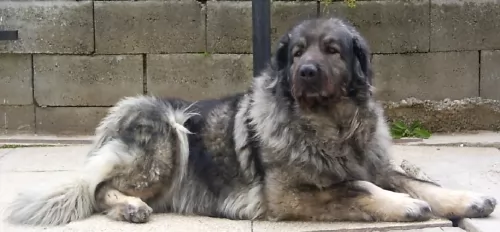 Hailing from Macedonia, the beautiful Sarplaninac dog was developed as a guardian of livestock and is large enough to fight off large predators like bears and wolves.
Hailing from Macedonia, the beautiful Sarplaninac dog was developed as a guardian of livestock and is large enough to fight off large predators like bears and wolves.
Nobody is too sure of the breeds exact origins, though it is thought that its ancestors came to the Balkan Peninsula with people migrating from ancient Asia.
This huge dog is one of the oldest native breeds from ancient Molosser breeds. The dog was recognized in 1939, and in 1954 it became known as the Yugoslav Shepherd Dog. Later the name changed and the dog was recognized by the United Kennel Club in 1995.
 The Brittany is much like other hunting dogs – pointers and retrievers – in size and stature. He is solid and strong but not heavy. He is compact with an average size head and floppy ears, docked tails or short natural tails, and expressively intelligent looking eyes. He is athletic, energetic, and alert. He has a long, elastic and free gait. The French dog is smaller and the dog with black spots is accepted. The American Brittany is larger and only a tri-color of orange, liver and white is acceptable.
The Brittany is much like other hunting dogs – pointers and retrievers – in size and stature. He is solid and strong but not heavy. He is compact with an average size head and floppy ears, docked tails or short natural tails, and expressively intelligent looking eyes. He is athletic, energetic, and alert. He has a long, elastic and free gait. The French dog is smaller and the dog with black spots is accepted. The American Brittany is larger and only a tri-color of orange, liver and white is acceptable.
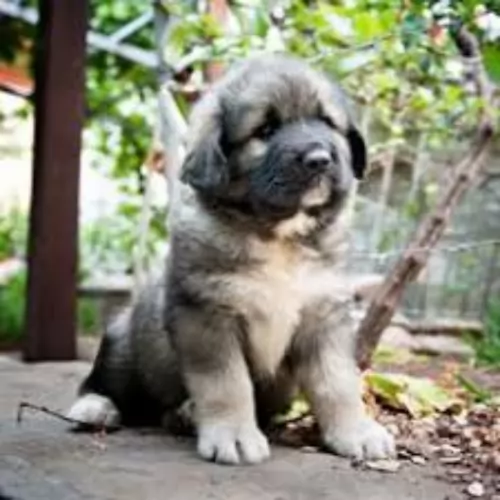 The Sarplaninac is a large, strong, fluffy dog standing at between 54 and 62cm in height and weighing between 30 and 45kg.
The Sarplaninac is a large, strong, fluffy dog standing at between 54 and 62cm in height and weighing between 30 and 45kg.
The coat of the dog is dense, coarse and of medium length. Colors are different shades of grey, white, tan and black. The head is large, the ears are fairly short but are floppy and covered with short hair. The dog is deep chested and the tail is long, often held high and covered with thick, feathery hair.
Protective, reliable, reserved, stubborn and gentle, this intelligent dog is fairly serious, and while he makes a devoted family pet, he is cool and wary of strangers.
Excellent training and socialization makes him well mannered, balanced and obedient around different people. He will tolerate children but won’t take easily to other pets in the house, capable of becoming aggressive with them.
 The Brittany is particularly trainable and friendly. They love to play and are sweet-natured. They don’t due well with harsh correction though and a stern look will cause them to wither. Socialize them young or they can become shy around strangers. They are loyal and family oriented. They can easily become attached to their humans.
The Brittany is particularly trainable and friendly. They love to play and are sweet-natured. They don’t due well with harsh correction though and a stern look will cause them to wither. Socialize them young or they can become shy around strangers. They are loyal and family oriented. They can easily become attached to their humans.
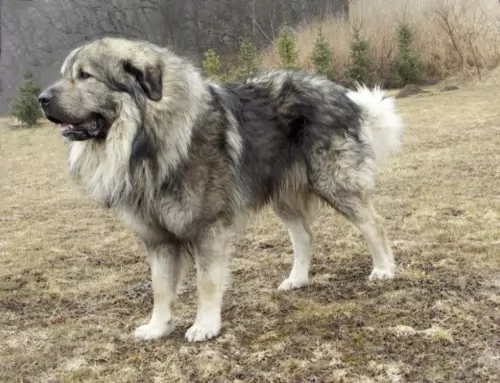 These dogs are protective, but they’re not vicious. When properly raised they are wonderful family pets.
These dogs are protective, but they’re not vicious. When properly raised they are wonderful family pets.
True, it’s a large, strong willed dog that isn’t a good choice for the first-time dog owner. They are good with children, but only children who have been taught how to treat animals with care and patience.
This dog is a powerful guardian type of dog, imposing in size, but it’s all about upbringing, and if you bring him up well then he can make a tremendous pet and companion.
 The breed is a hardy one and Brittanys are mostly healthy dogs. In Europe 1 in 5 dogs dies of old age and that age is usually 14 or 15 years. They do have a few issues that they may be susceptible to. These would include:
The breed is a hardy one and Brittanys are mostly healthy dogs. In Europe 1 in 5 dogs dies of old age and that age is usually 14 or 15 years. They do have a few issues that they may be susceptible to. These would include:
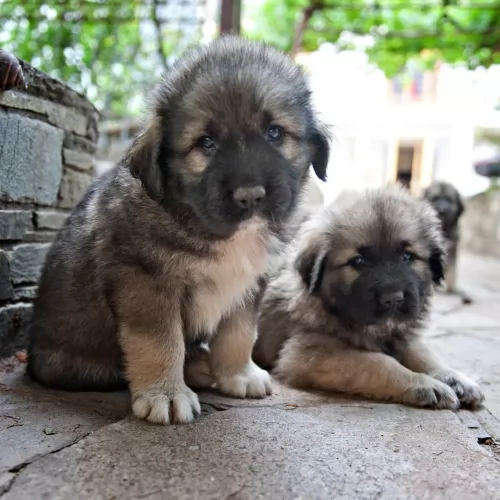 The Sarplaninac dog is a robust dog but he can suffer from health issues such as hip dysplasia, obesity, bloat, ear infections and skin allergies.
The Sarplaninac dog is a robust dog but he can suffer from health issues such as hip dysplasia, obesity, bloat, ear infections and skin allergies.
When your dog gazes up at you with such love in his eyes, don’t be tempted to pop some chocolate into his mouth or let him finish off your ice-cream. Treats like this can damage your pet’s health and give him heat intolerance, breathing difficulties, hypertension, liver disease and diabetes.
 Don’t overfeed your Brittany. Keep him at hunting weight by feeding a half a cup up to 2 cups per day depending on the size of your dog and activity levels. Serve this in two meals not one.
Don’t overfeed your Brittany. Keep him at hunting weight by feeding a half a cup up to 2 cups per day depending on the size of your dog and activity levels. Serve this in two meals not one.
Ears – prone to infections – make sure that you check them and wipe them out routinely to prevent infections.
Hip Dysplasia – bones don’t fit well into joints – this can be genetic or otherwise, causing lameness and arthritis. If severe it can require surgery to correct.
Epilepsy – mild or serious seizures are possible. This can be genetic/hereditary but is set off by an infectious disease of the brain, head injury, poison, tumor, or metabolic disorder. There is no cure, but medication can be very effective.
Hypothyroidism – Low levels of thyroid hormone – can cause drooping eyelids, obesity, lethargy, mental difficulties or irregular heat cycles or all of this. Medication is available as it is for humans but must be taken daily for the rest of the dog’s life
Canine Discoid Lupus Erythematosus – autoimmune disease that is rare in dogs. Cats and humans can also have it. It is a skin disease and does not become the more serious and deadly Systemic Lupus. The Discoid version of this disease causes loss of pigmentation and a scaling on the nose which can then progress to the skin around the ears, eyes and genitals. There could be ulcerated lesions and tissue death in more severe cases. Sun exposure can make the condition worse.
The Brittany is a hunting dog that acts like a pointer but will retrieve fowl and birds in the water or on land. If you don’t hunt, the Brittany can still be your family dog. They need lots of exercise and mental stimulation. They need a job if they are not going to hunt and expect them to be distracted by every bird they see. Try flyball, agility, FAST CAT, field trials and dock diving. They are very task oriented and have boundless energy. They excel at obedience and confirmation as well.
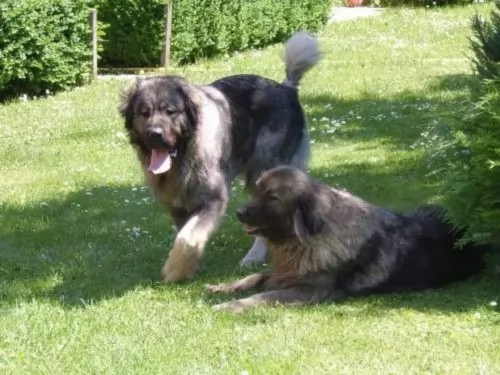 Every dog needs care from puppyhood through to old age.
Every dog needs care from puppyhood through to old age.
Šarplaninacs are looked upon as medium maintenance dogs. The coat is long and thick and requires a firm bristle brush to get their hair brushed.These dogs are moderate shedders so a brush twice a week will do the trick to keep the hair free of loose hair and matting.
Because these dogs have floppy ears, they will need to be checked and cleaned. Floppy eared dogs battle with moisture and wax build-up that increases the likelihood of ear infections.
Check the eyes that they are clear and free of discharge. Eyes with a lot of discharge can be indicative of health problems.
Check for any unusual lumps as cancer often starts with a new lump.
Provide your pet with a nice warm, dry place to sleep.
Keep his vaccines up to date to prevent deadly canine diseases.
Have him or her spayed or neutered if you don’t want puppies. These are regular procedures for a vet and offers health benefits for the dog. Neutering a male improves his character and keeps him from roaming. These dogs are capable of having 3 – 8 puppies.
The Sarplaninac requires decent food if he is to remain healthy. Dog’s stomachs can become upset if they eat all kinds of sweet and spicy human foods.
Commercially manufactured dog food is a good backup food to have because of its convenience. Try to include some home-made food. Simply add into one big pot chicken, brown rice or pasta and spinach, sweet potatoes and carrots. This food can all be chopped up and added in to the dry kibble twice a week. Give this to your pet twice a week and see how his tails wags when he smells it.
Also try to add in some raw meat to his food occasionally.
Ensure there is always a bowl of fresh, cool water within his reach.